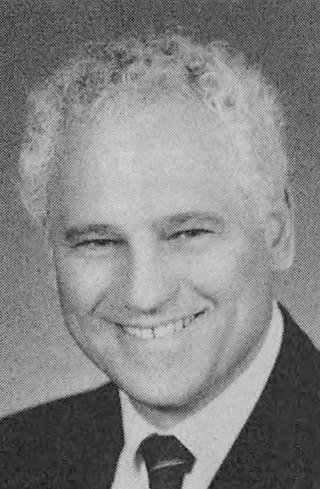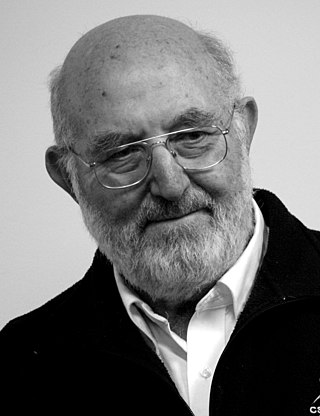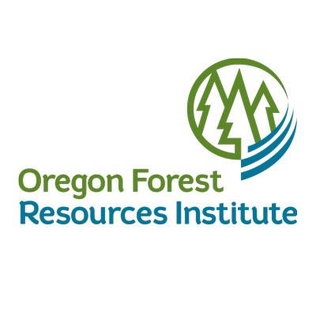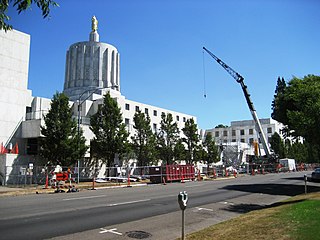Related Research Articles

Theodore Ralph Kulongoski is an American politician, judge, and lawyer who served as the 36th Governor of Oregon from 2003 to 2011. A member of the Democratic Party, he served in both houses of the Oregon Legislative Assembly and also served as the state Insurance Commissioner. He was the Attorney General of Oregon from 1993 to 1997 and a justice of the Oregon Supreme Court from 1997 to 2001. Kulongoski has served in all three branches of the Oregon state government.

Neil Edward Goldschmidt was an American businessman and Democratic politician from the state of Oregon who held local, state, and federal offices over three decades. After serving as the United States Secretary of Transportation under President Jimmy Carter and governor of Oregon, Goldschmidt was at one time considered the most powerful and influential figure in Oregon's politics. His career and legacy were severely damaged in 2004 by revelations that he raped a young teenage girl in 1973, during his first term as mayor of Portland.

Barbara Kay Roberts is an American politician from the state of Oregon. A native of the state, she served as the 34th Governor of Oregon from 1991 to 1995. She was the first woman elected to serve as Oregon governor, and the only woman elected to that office until 2016. A Democrat, Roberts was also the first woman to serve as majority leader in the Oregon House of Representatives. She also won two terms as Oregon Secretary of State, and served in local and county government in Portland. Roberts was married to Oregon state Sen. Frank L. Roberts from 1974 until his death in 1993. From February 2011 until January 2013, she served on the council of Metro, the regional government in the Portland metropolitan area.

The U.S. state of Oregon established vote-by-mail as the standard mechanism for voting with Ballot Measure 60, a citizen's initiative, in 1998. The measure made Oregon the first state in the United States to conduct its elections exclusively by mail. The measure passed on November 3, 1998, by a margin of 69.4% to 30.6%. Political scientists say Oregon's vote by mail system contributes to its highest-in-the-nation rate of voter turnout, at 61.5% of eligible voters.

Willamette Week (WW) is an alternative weekly newspaper and a website published in Portland, Oregon, United States, since 1974. It features reports on local news, politics, sports, business, and culture.

The Oregon Historical Society(OHS) is an organization that encourages and promotes the study and understanding of the history of the Oregon Country, within the broader context of U.S. history. Incorporated in 1898, the Society collects, preserves, and makes available materials of historical character and interest, and collaborates with other groups and individuals with similar aims. The society operates the Oregon History Center that includes the Oregon Historical Society Museum in downtown Portland.

Vicki Lynn Walker is an American politician. She served as the Oregon State Director for Rural Development with the U.S. Department of Agriculture. A member of the Democratic Party, Walker previously served in both houses of the Oregon Legislature and briefly served as chair of the state's parole board. Walker is known as an advocate for utility customers and as an outspoken critic of influential former Governor Neil Goldschmidt.
The Oregon Court of Appeals is the state intermediate appellate court in the US state of Oregon. Part of the Oregon Judicial Department, it has thirteen judges and is located in Salem. Except for death penalty cases, which are reserved to the Oregon Supreme Court, and tax court cases, it has jurisdiction to hear all civil and criminal appeals from Oregon circuit courts, and to review actions of most state administrative agencies. The 13 judges of the court are chosen by the people in statewide nonpartisan elections to six-year terms, and have as their administrative head a Chief Judge appointed from their number by the Chief Justice of the state Supreme Court.

Katherine Brown is an American politician and attorney who served as the 38th governor of Oregon from 2015 to 2023. A member of the Democratic Party, she served three terms as the state representative from the 13th district of the Oregon House of Representatives from 1991 to 1997, three terms as the state senator from the 21st district of the Oregon Senate from 1997 to 2009, three terms as majority leader of the Oregon Senate from 2003 to 2009, and two terms as Oregon Secretary of State from 2009 to 2015. She assumed the governorship upon the resignation of John Kitzhaber in 2015. She was elected to serve out the remainder of his gubernatorial term in the special election in 2016 and was reelected to a full term in 2018.

The government of Portland, Oregon is based on a city commission government system. Elected officials include the mayor, commissioners, and a city auditor. The mayor and commissioners are responsible for legislative policy and oversee the various bureaus that oversee the day-to-day operation of the city. Portland began using a commission form of government in 1913 following a public vote on May 3 of that year. Each elected official serves a four-year term, without term limits. Each city council member is elected at-large.
The Independent Party of Oregon (IPO) is a centrist political party in the U.S. state of Oregon with more than 140,000 registrants since its inception in January 2007. The IPO is Oregon's third-largest political party and the first political party other than the Democratic Party and Republican Party to be recognized by the state of Oregon as a major political party.

Merwyn Ronald "Mitch" Greenlick was a Democratic politician from the U.S. state of Oregon. He represented District 33 of the Oregon House of Representatives.

The Oregon Forest Resources Institute (OFRI) is a state agency that according to Oregon Public Broadcasting and The Oregonian operates as the timber industry's de facto lobbying organization in Oregon.
The State Accident Insurance Fund Corporation (SAIF) is a not-for-profit, state-chartered workers’ compensation insurance company in the U.S. state of Oregon. It provides workers' compensation insurance and workplace safety services for Oregon employers, and claim management for injured workers. It is based in Salem, Oregon.

The Seventy-fourth Oregon Legislative Assembly was the Oregon Legislative Assembly (OLA)'s period from 2007 to 2008. There was a regular session in 2007, and a shorter special session in 2008.

Elizabeth Katharine "Betsy" Johnson is an American aviator, entrepreneur, and politician who served in the Oregon House of Representatives from the 1st and 31st House districts from 2001 to 2005, and in the Oregon Senate from the 16th district from 2005 to 2021, as a member of the Democratic Party. Prior to her tenure in the state legislature she served on the Port of St. Helens board and worked in the Oregon Department of Transportation.

The 75th Oregon Legislative Assembly convened beginning on January 12, 2009, for its biennial regular session. All of the 60 seats in the House of Representatives and half of the 30 seats in the State Senate were up for election in 2008; the general election for those seats took place on November 4.

Oregon Field Guide is a weekly television program produced by Oregon Public Broadcasting focusing on recreation, the outdoors, and environmental issues in the state of Oregon. The show has become part of the Oregon zeitgeist. Steve Amen is the show's creator and original Executive Producer. Ed Jahn, producer with Oregon Field Guide since 2000, became host and Executive Producer in 2016/2017 upon Steve Amen's retirement. Named for the field guides used to identify plants, animals, and natural phenomenon, the wide-ranging series covers Oregon natural history, outdoor recreation, conservation, agriculture, rural life, and other local subjects. Produced with deep narratives rather than short segments, roughly 13 half-hour episodes and specials are shown per year.

The 81st Oregon Legislative Assembly was the legislative session of the Oregon Legislative Assembly that convened on January 11, 2021 and adjourned June 26th. Its even-year short session of 35 days convened on February 1, 2022 and adjourned sine die on March 4, 2022.
References
- ↑ Legislative Counsel Committee, CHAPTER 284—Organizations for Economic Development (2017) (last accessed Jan. 28, 2019).
- ↑ "Oregon Shines, Oregon's Strategic Vision". www.oregon.gov. Archived from the original on 2004-04-23.
- 1 2 3 WAHPEPAH, WILDA (June 7, 1990). "GOLDSCHMIDT'S CHALLENGE: PROTECT OREGON'S LIVABILITY". The Oregonian.
- ↑ Wong, Peter (March 14, 2008). "Foundations give money to Oregon Shines". The Statesman Journal.
- ↑ MAPES, JEFF (April 19, 2005). "OREGONIANS, YOUR STATE IS AVERAGE, ACCORDING TO ITS BIENNIAL BAROMETER". The Oregonian.
- ↑ "Oregonians' information gap". The Oregonian. April 5, 2009.
- ↑ "Progress Board finds little change". The Associated Press. The Bend Bulletin. February 19, 2009.
- ↑ Bruce Weber; Lena Etuk; Sonia Worcel; Vincent Adams (January 31, 2014). "Tracking Oregon's Progress: A Report of the Tracking Oregon's Progress (TOP) Indicators Project" – via www.issuelab.org.